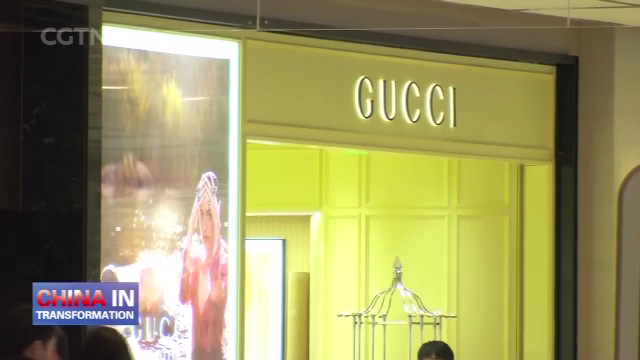
17:34, 18-Dec-2018
40 Years of Development: A demanding middle class leads the way
Updated
16:43, 21-Dec-2018
03:41

When China's opening up policy began 40 years ago, manufacturing boomed thanks to cheap labor. But the rise in consumer spending power has brought a new wave of international investment and fueled the retail sector. CGTN's Sean Callebs explains how China's growing middle class is affecting foreign investment.
It's hard to imagine a city more international than Shanghai. The city is a good snapshot of the changing economic landscape in China.
At a local mall, 26-year-old school teacher Zhang Yuanyuan spends her hard-earned money on Chanel or Yves St. Laurent make-up or perhaps a Louis Vuitton bag. She's one of a growing army of Chinese consumers eyeing pricey internationally-made items.
ZHANG YUANYUAN CONSUMER "The situation varies. It depends on the salary. If you are wealthy you will choose international brands, but if you are paid less - maybe you will choose the Chinese brand."
Well-known brand-names jump out at you at every turn. There has been a dramatic shift, to consumerism, here - from the days of foreign investment in factories, and cheap labor.
And, this consumer revolution was really energized when China joined the World Trade Organization back in 2001.
SEAN CALLEBS SHANGHAI "China, as a nation of consumers, has come a long way in just a few decades. High end shopping with brands such as Gucci, Louis Vuitton, and Chanel are the norm in major cities. And with the growing middle class, you can expect no shortage of international companies eager to flock here, to separate consumers from their RMB."
ANDREW WU PRESIDENT OF GREATER CHINA GROUP, LVMH "The Chinese middle class has a very important feature everyone is talking about - that is its youth."
Andrew Wu, holds a powerful post, as the Greater China head of LVMH - the parent company of Louis Vuitton, and some 70 odd other companies it has. We caught up with him, at an exhibition Louis Vuitton is hosting in Shanghai.
ANDREW WU PRESIDENT OF GREATER CHINA GROUP, LVMH "The Chinese middle class is also unique in the sense that they are doing extraordinarily better than their parents' generation. Much better, obviously more optimistic, upwardly mobile, and of course we are talking about greater numbers."
Wu estimates as many as 300-million people make up China's middle class. That is important - because it means more local consumption - more stores, more rent money, more advertising dollars. Economists say that something called FDI, or Foreign Direct Investment makes up one-fourth of Shanghai's GDP and it is growing.
WANG YONGQIN ECONOMICS PROFESSOR OF FUDAN UNIV. "I think in the future China should be even more open, especially in the financial sector. Because previously FDI was mostly in manufacturing."
Go to any high-end shopping center, and look. Louis Vuitton bags, Chanel shoes, Chinese consumers are discerning.
WANG JIANI CONSUMER "For me, I think the brand is very important because their quality and they are very easy to be recognized."
Business titans like Andrew Wu say China is leaving pirated, or counterfeited goods, in its rearview mirror. And doing a better job of protecting intellectual property.
ANDREW WU PRESIDENT OF GREATER CHINA GROUP, LVMH "So it is a very visible improvement, as China moves from being backward toward something that is today - something even better."
Sophisticated, and elaborate are not terms that applied to most Chinese consumers a decade ago. But its economy and its customers are maturing. And, that is something impossible to put a price tag on.
Sean Callebs, CGTN, Shanghai.

SITEMAP
Copyright © 2018 CGTN. Beijing ICP prepared NO.16065310-3
Copyright © 2018 CGTN. Beijing ICP prepared NO.16065310-3